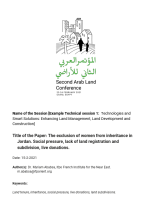Land Library Search
Through our robust search engine, you can search for any item of the over 73,000 highly curated resources in the Land Library.
If you would like to find an overview of what is possible, feel free to peruse the Search Guide.
/ library resources
Showing items 1 through 9 of 74222.Land is one of the most valuable assets in Jordan.
Property ownership is a male domain in Jordan, where women are dependent on men for housing. A patriarchal pattern of power dominates both inheritance and property.
A patriarchal pattern of power dominates both inheritance and property in Jordan. This pattern affects women, but also the youth - which is much less studied.
Algeria -Country Narrative .Arabic
South Africa's Expropriation Act of 2024, is at the centre of international controversy following lobbying by Afriforum and punitive actions by US President Donald Trump.
In the past two months Knowledgebase.land (KBL) has carried links to news highlighting recent developments in the region's mining sector across five countries.
This report provides a critical update to the 2017 Rights and Resources Initiative (RRI) analysis Power and Potential. It evaluates the extent to which national laws, as of 2024, recognize the specific community forest rig
Since UNFCCC CoP29 in November 2024 and the nominal approval of Article 6.4 of the Paris Agreement, the regulatory landscape has been rapidly changing.







